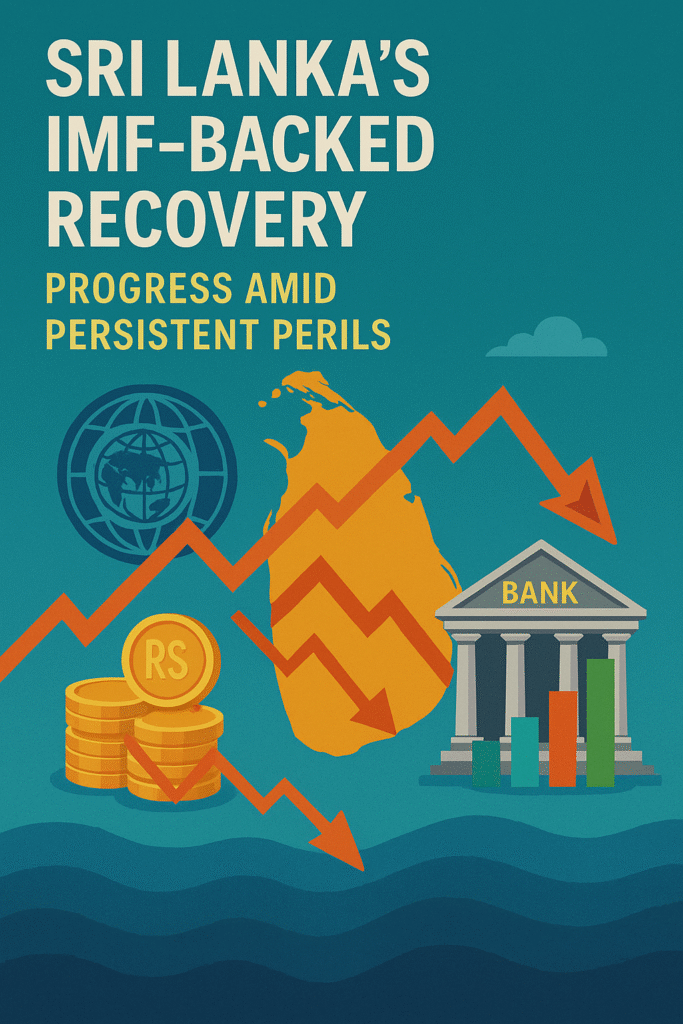
Sri Lanka’s economic revival under its Extended Fund Facility (EFF) program with the International Monetary Fund (IMF) has drawn cautious praise, with the Fund highlighting strides in growth, inflation control, and reserve accumulation. Yet, beneath the surface of these achievements lie vulnerabilities that threaten to unravel progress unless structural reforms are deepened and global headwinds navigated with precision.
The IMF’s recent assessment underscores a nation clawing back from economic collapse. A projected 5% growth rate for 2024 and plummeting inflation to 2.6% by March 2025 reflect stabilization efforts, bolstered by proactive central bank interventions that have rebuilt foreign reserves to $6.5 billion—a critical buffer for a country that defaulted on its debt in 2022. Fiscal reforms, including broadening the tax base and reducing deficits, signal restored confidence in Colombo’s reform agenda after years of policy missteps. However, these gains remain fragile. Global economic uncertainty, volatile commodity prices, and tightening financial conditions loom as existential threats, capable of derailing export earnings and delicate debt restructuring negotiations. Domestically, limited fiscal flexibility restricts the government’s ability to cushion shocks, while delays in governance and anti-corruption reforms risk eroding public trust.
The IMF’s prescription for sustained recovery emphasizes revenue enhancement through improved tax compliance, including restoring an efficient VAT refund system—a move that avoids immediate tax hikes but places immense pressure on Sri Lanka’s historically inefficient tax administration. While the Fund’s caution against new tax exemptions is prudent, aggressive revenue drives risk stifling business activity and consumer spending in an economy still recovering from severe contraction. Parallel reforms in the energy sector, notably cost-reflective electricity pricing, aim to reduce the Rs. 200 billion annual burden of utility subsidies on state coffers. Though economically rational, such measures could trigger public backlash without safeguards for low-income households, testing the government’s resolve to balance fiscal discipline with social equity.
The push for “targeted, adequately funded, and time-bound” social safety nets is vital to protect vulnerable groups, yet execution challenges persist. Sri Lanka’s uneven track record in efficiently channeling welfare benefits raises concerns about exclusion errors and politicization, underscoring the need for transparent mechanisms. Meanwhile, the Central Bank’s success in rebuilding reserves, while commendable, risks diverting resources from critical public investments in healthcare and education. Maintaining inflation at 2.6%—below the 5% target—reflects subdued demand in a still-fragile economy, but vigilance remains crucial amid risks of imported inflation from currency fluctuations and fuel price shocks.
Political economy challenges further complicate the path to stability. High-level engagement between the IMF delegation and Sri Lankan leadership—including President Anura Kumara Dissanayake and Prime Minister Harini Amarasuriya—highlights the stakes of reform continuity. With elections on the horizon and shifting political priorities, the government’s ability to resist populist measures, such as untargeted subsidies or tax cuts, will determine whether reforms outlive political cycles. Bipartisan support for the EFF program is crucial, yet the temptation to prioritize short-term electoral gains over long-term structural adjustments remains a persistent risk.
As Sri Lanka approaches the fourth review of its EFF program, lasting stability demands more than technical compliance with IMF benchmarks. Strengthening institutions, enhancing transparency, and fostering inclusive growth are non-negotiable. The Fund’s insistence on “strong policy implementation” must be matched by grassroots accountability to ensure reforms benefit the broader population, not just macroeconomic indicators. While the IMF’s endorsement offers a lifeline, true recovery hinges on transcending short-term fixes to address systemic inequities and governance failures. The international community’s role extends beyond financial support—it must advocate for reforms that prioritize human development alongside fiscal discipline, ensuring Sri Lanka’s revival is both sustainable and equitable.
This article was published on Publicfinance.pk
Source: lankanewsweb.net
